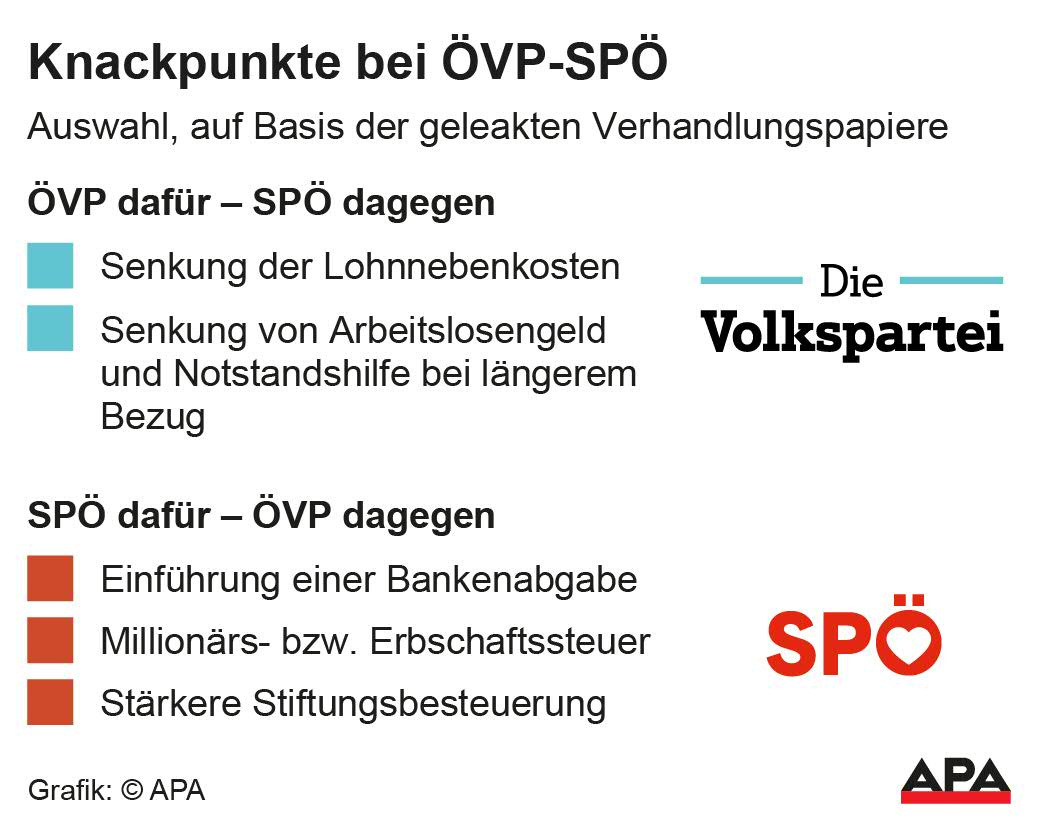```html
Coalition Negotiations: The Sticking Points Between ÖVP, SPÖ, and NEOS
```

The protocols of the coalition negotiations between ÖVP and SPÖ, which already leaked in early January from the then failed talks. Particularly in the economic area, there were conflicts with the SPÖ at that time.
Budget, Taxes, and Chambers as Sticking Points Between ÖVP, SPÖ, and NEOS
The three parties were far apart on budget and tax issues. The SPÖ also demanded the introduction of a bank levy rejected by the ÖVP - it was also considered one of the major sticking points in the Blue-Turquoise coalition. The SPÖ also hit a brick wall with its core demand for a millionaire or inheritance tax and a stronger foundation tax. The Reds, in turn, rejected a significant reduction in non-wage labor costs. A reform of the chambers, including an end to compulsory membership, was demanded by the NEOS - as recently also by the FPÖ. Both ÖVP and SPÖ rejected the proposal. A degressive unemployment benefit, which decreases over time, also found no majority. The same applies to the valorization of unemployment benefits and emergency assistance. A debate on the role of elective doctors was postponed by the initially failed three-party coalition.

ÖVP, SPÖ, and NEOS Agree on Education Leave and Labor Market Reform
However, there were already agreements: ÖVP, SPÖ, and NEOS wanted to reform education leave by raising the access barriers. The labor market measure should no longer be possible following parental leave. A reform of social assistance was also already on track. The states should continue to pay for it, but it would have been handled through the AMS. They also agreed on the continuation of highway projects stopped by the Green Minister of Climate Protection Leonore Gewessler, such as the Lobau tunnel. The climate bonus should not be completely abolished, unlike the blue-turquoise plans, but evaluated and reformed. The NEOS wanted to reform the diesel privilege, which SPÖ and ÖVP rejected. The other two also said no to the red wish for the introduction of a fertilizer and pesticide levy.
ÖVP, SPÖ, and NEOS United on European Issues
One of the biggest stumbling blocks between FPÖ and ÖVP, European policy, is likely to be cleared away in renewed negotiations. According to SPÖ, the European Union must "gain strength economically, socially, and politically," as stated in the protocols. Clear commitments to the EU are also known from the ÖVP and the NEOS. But a "clear focus of EU policy on the joint fight against irregular migration" was already undisputed. The parties were also already in agreement on supporting Ukraine in the sense of the European path. A separate "Ukraine Coordinator" should be appointed. For the "further improvement of basic military service," the appointment of a separate basic military service commissioner was also planned. Regarding the missile defense rejected by the FPÖ, the paper from ÖVP, SPÖ, and NEOS states: "Our contribution to the European air defense shield Sky Shield will be consistently continued." However, the acquisition of long-range missiles was already controversial in the negotiations.
ÖVP, SPÖ, and NEOS: Open Questions on Federal Prosecutor's Office and ORF Contribution
The introduction of a federal prosecutor's office was discussed in detail between the three negotiators, which all basically supported. It was questionable whether it should have a single or three-person leadership. A child basic security, a wish of the SPÖ, still required discussion. Further savings for the ORF were undisputed. Not increasing the ORF contribution from 2026 found no consensus, nor did the proposal from SPÖ and NEOS to abolish the hearing rights of the state governors. In the paper of the subgroups that emerged in early January, large parts had not yet been discussed at all. Therefore, if negotiations between at least two of the parties occur again, there is still much need for discussion.
(APA/Red)
This article has been automatically translated, read the original article here.





